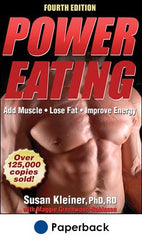Get the facts about weight-gain powders
This is an excerpt from Power Eating-4th Edition by Susan Kleiner & Maggie Greenwood-Robinson.
You've seen them: huge cans brightly labeled with alluring product descriptions such as “weight gainer,” “solid mass,” “lean mass enhancer,” or “muscle provider.” These products belong to a group of supplements known as weight-gain powders. Most contain various combinations of carbohydrate, protein, amino acids, vitamins, minerals, and other ingredients thought to enhance performance. The manufacturers of these products claim that their specific formulations will help you pack on muscle.
But do they? Actually, no one knows for sure. However, in 1996 a group of researchers at the University of Memphis put two weight-gain powders to the test. One was Gainers Fuel 1000, a high-calorie supplement that adds about 1,400 calories a day to the diet (290 grams of carbohydrate, 60 grams of protein, and 1 gram of fat). Although the supplement contains many other ingredients, it's formulated with two minerals that have been hyped as muscle builders: chromium picolinate and boron.
Chromium picolinate is linked to muscle growth because it increases the action of insulin. But that's where the association ends. There's no valid scientific evidence that chromium directly promotes muscle building.
Boron has been touted as a supplement that promotes muscle growth by increasing the amount of testosterone circulating in the blood. But experiments have failed to verify this claim. In one recent study, 10 male bodybuilders took 2.5 milligrams of boron daily while 9 male bodybuilders took a placebo. Both groups performed their regular bodybuilding routines for seven weeks. Lean mass, strength, and testosterone levels increased in all 19 men to the same relative degree. Boron supplementation didn't make a bit of difference. It was the training, pure and simple, that did the trick.
Back to the 1996 study on weight-gain powder: The second supplement investigated was Phosphagain. It adds about 570 calories a day to the diet (64 grams of carbohydrate, 67 grams of protein, and 5 grams of fat). As with most weight-gain powders, Phosphagain contains lots of other ingredients that are rumored to build muscle. Among the most notable are creatine (see the previous section), taurine, nucleotides, and l-glutamine. An amino acid found in muscles, taurine has been found in animal studies to enhance the effectiveness of insulin. Nucleotides are the building blocks of RNA and DNA; in Phosphagain, they are derived from the RNA in yeast. Nucleotides are fundamental to metabolism and integral to the cell division and replication involved in growth and development. As for l-glutamine, an amino acid, it theoretically regulates the water volume in cells and the protein-making process in muscles.
To check the effects of Gainers Fuel 1000 and Phosphagain on muscle growth, the University of Memphis researchers selected 28 strength-trained men around the age of 26. None was currently taking anabolic steroids, and none had a history of steroid use. The subjects had been training for an average of six years.
The researchers assigned them to one of three groups: a third of the men took a maltodextrin supplement three times a day (maltodextrin is a carbohydrate derived from corn); a third took two servings a day of Gainers Fuel 1000 according to the manufacturer's directions; and the remaining third took three servings a day of Phosphagain according to the manufacturer's directions. None knew which supplement they were taking. They all continued their normal workouts and diets during the course of the study. In addition, they were told to not take any other supplements two weeks before the study and until the study was over.
Here's a summary of what the researchers discovered:
- Both the maltodextrin supplement and Gainers Fuel 1000 promoted modest gains in muscle mass in combination with a strength-training program.
- In the group that supplemented with Gainers Fuel 1000, fat weight and percent body fat increased significantly.
- Phosphagain supplementation was more effective in promoting muscle gains than either maltodextrin or Gainers Fuel 1000 during strength training. In fact, muscle gains were significantly greater with Phosphagain, according to lead researcher Dr. Richard Kreider. The men who supplemented with Phosphagain did not gain any additional fat.
Before you draw your own conclusions, let me emphasize: It's still up in the air as to exactly which ingredients in Phosphagain were responsible for these results. More tests are needed on weight-gain powders in general as well as on the individual ingredients they contain in order to confirm these findings. But, carbohydrate with some protein (weight-gain powders contain both) taken at the proper times is an important supplement to a muscle-building diet. Also, the creatine in Phosphagain could have been a factor in the results.
Weight-gain powders are helpful for increasing calories when you can't increase your calories from food alone. But keep in mind that these products are often quite high in calories (500 to 1,000 calories). Sure, those calories can help you gain weight, but that weight might wind up as fat. It is far easier to control your body composition by controlling your protein, carbohydrate, and fat ratios yourself.


Get the latest insights with regular newsletters, plus periodic product information and special insider offers.
JOIN NOW
Latest Posts
- How do I integrate nutrition education into PE?
- How does the support of friends and family influence physical activity?
- What makes the Physical Best approach unique?
- Strength training gimmicks . . . or not?
- How do vitamins and minerals support our bodies?
- Why do many people have difficulty losing weight?


